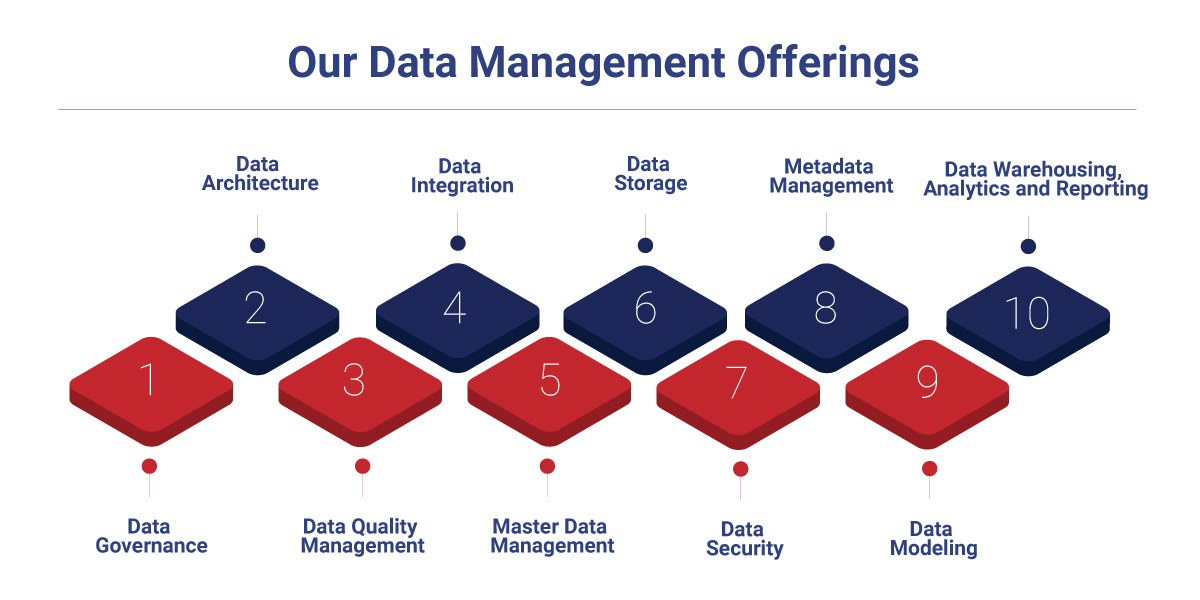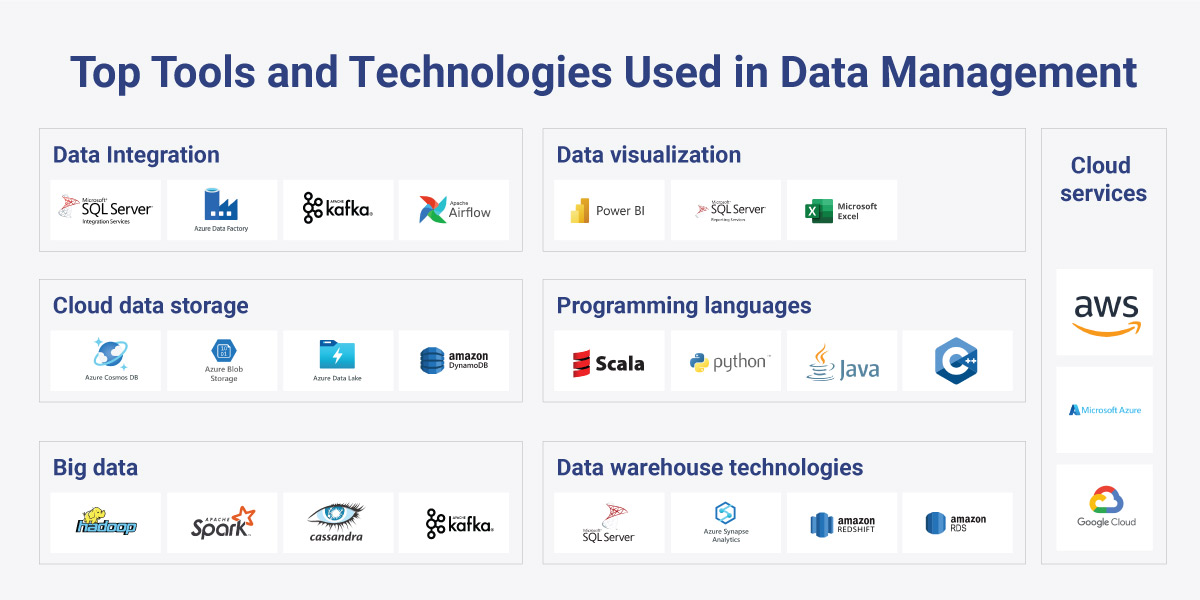Your business collects and processes a lot of data. That data is gold to your business, but quite a lot of that data is complex and unstructured, and managing the data to improve business decisions is becoming challenging. Today, organizations rely upon the highest data quality to achieve more effective and actionable data strategy.
To reimagine the way your data is controlled, managed, and governed, Rishabh Software offers top-of-the-line expertise in your data maturity journey to streamline operational efficiency. To enable innovation through Data Management services, we aim to help you strategically optimize your data to make data-driven decisions by leveraging the full potential of data.
Data Management Services Offered by Rishabh Software
To seize the opportunity and harness the power of zettabytes of data, we provide an array of data management services. Our end-to-end data management lifecycle includes a comprehensive process, right from data collection to data cleaning and data integration to data visualization. Let’s explore our key data management services.

Data Governance
Organizations need data governance to ensure critical data availability, quality, and security. Your data governance policy defines the methods, technologies, and behavior for properly managing data. Our Data Governance services are designed to help you achieve data consistency, transparency, and compliance with adherence to data protection standards.
Data Architecture
Data architecture defines a framework that governs an organization’s approach to creating and managing data flow. Data Architecture aims to ensure that data is managed properly and meets business needs for information. It sets the blueprint for data and how it is captured, integrated, analyzed, and flows through data storage systems. With business data’s growing volume and velocity, data architecture is critical to ensure that you avoid data redundancy, improve data quality and integrate data across domains to break down silos.
Our range of data architecture service offerings ensures the creation of robust, high-performance, and scalable data architecture strategies to fulfill your enterprise data management goals and stay competitive in the modern data landscape.
Data Integration
Data integration is the practice of combining data from one or more systems to another system. Data integration can have multiple different types of sources, from on-premise data to the cloud. The targets for data integration can be a database, data warehouse, data lake, or even a modern streaming platform like Kafka. Thus, it includes consolidating data from disparate data sources with the ETL/ ELT (Extract Load Transform) process and data virtualization.
Our data integration and Data Engineering Services can help you develop, manage, transform, and deliver Data Analytics Flows to make your business Data Analytics ready.
Data Quality Management
Data quality management is concerned with cleaning a company’s collected data, similar to how the ETL tool transforms data. Data quality management refines, cleans, and standardizes data to ensure that data is represented uniformly across all databases, systems, and applications. DQM thus cleans the data of any inconsistency and standardizes it into one version.
We have in-depth knowledge and extensive experience in managing all aspects of data quality management to identify and correct incomplete, irrelevant, and inconsistent data to help you resolve your data quality problems.
Data Storage
Data Storage is the practice of preserving and managing data effectively. All data is not created equal; therefore, it involves understanding the business value of data for defining data storage strategy for active and archival data. Our Data Storage management services include network virtualization, replication, security, compression, deduplication, traffic analysis, process automation, and memory management.
Master Data Management
Master data management is the process of creating one single version of truth (master reference) for all important business data. The three key pillars of effective MDM are data consolidation, data governance, and data quality management. It helps your organization consolidate, structure, and provide data accessibility across organizational silos to drive fast and scalable insights. With our expertise in MDM, we ensure that your organization is always working with and making decisions based on one single version of data.
Metadata Management
Metadata management is the process of establishing policies and processes to organize, structure, and store data assets within the growing volume of information. Effective metadata management ensures that your organization can efficiently locate, access, understand, and utilize data assets. With our Metadata management expertise, we can help you improve data quality, data governance, and decision-making. As the complexity of data increases, metadata management gives clear and rich context to the enormous amounts of data.
Data Security
Today, when ransomware is rampant, if data is not secured, it can be compromised and have significant negative financial and operational repercussions, including heavy fines and loss of trust. A robust data security prepares the organization to protect data and improve cyber-resilience. Using tools like IAM, MFA, RBAC, WORM, Encryption, and Secure SSH, among others, we can help you make your data management more secure.
Data Warehousing, Analytics and Reporting
Enterprise data warehouse helps to bridge the gap between data management and data analytics. As a centralized data management system, it collects data from various sources, and organizes it as a single source of truth. We aim to structure the data with our innovative approach to unleash the true potential of your data to improve your entire decision-making process.
Data Modeling
Data modeling is a simple visual representation of your system and the data those systems contain. It is used as a blueprint for designing a new database, making it easier for your team to see how data flows. It also assesses and analyzes data requirements required to support business processes. Our Data Analytics consultant can help you craft a strategic digital strategy to fulfill your evolving business needs.
Data Management Best Practices
Here are key data management best practices to address data management challenges and ensure trusted data can be available:
Define Your Goal
Defining your organizational goals helps you determine the process for collecting, storing, organizing, cleansing, and analyzing data. Well-defined business objectives also ensure you only manage the data you need for decision-making.
Maintain Data Quality
Data quality is critical to ensure that your data management system provides your organization with reliable data. You must aim to streamline data collection and storage while also ensuring regular checks for accuracy so that you have relevant data. The process should also remove any outdated or incorrect data that can negatively impact data analytics. Since data is constantly changing, for instance, customers and vendors, it is important to update your system to ensure that data remains accurate constantly.
Implement Role Based Access Controls
In addition to ensuring data quality, implementing role-based access control is critical to ensure security and minimize the risk of data breaches. Establishing role-based access control (RBAC) at a granular level is advisable to secure sensitive data and critical applications. This safeguards sensitive information and promotes data privacy and compliance with regulatory requirements like HIPAA and GDPR.
Establish Strong File Naming Conventions and Meta Data
Digital asset file naming conventions and metadata are key to user-friendly and standardized data management. A strong fine naming system makes locating and accessing data easier but also ensures file consistency and organization. Similarly, metadata provides critical information about the data’s attributes, source, and usage, which allows users to understand and categorize data effectively. Following these practices can help enhance data discoverability and streamline data governance for more informed decision-making.
Prioritize Data Security
You must secure your data to protect it from unauthorized access and ensure you meet compliance requirements. Data security measures such as encryption, IAM access controls, and regular audits ensure data help you meet regulatory frameworks and avoid costly legal consequences. In times when data breaches and cyber threats are ever-increasing, prioritizing app data security plays a key role in protecting your organization’s vital information from potential breaches by applying more substantial levels of data control. It is essential to regularly monitor your data security strategy to adjust to emerging threats.
Benefits of Data Management
Well-structured data management helps you analyze your data for valuable insights, meet compliance requirements, and make informed decisions.
Security
Good data management includes implementing security measures to safeguard critical information against unauthorized access and cyber threats. By offering you greater control over your data, data Management helps you secure your data and avoid data breaches.
Reliability
Data management helps reduce potential errors by creating policies and processes for usage. Accuracy helps build trust in the data used for making decisions across the enterprise. With reliable, up-to-date data, data management allows you to respond more efficiently to market changes and make informed decision-making.
Improves Decision Making
Data management helps eliminate data silos and dependencies by integrating and consolidating data across systems. It thus enables organizing, analyzing, and maintaining quality data for valuable insights. Data management services enhance decision-making by providing a single source of truth with accurate, current data. They also facilitate data analysis, uncovering valuable insights for improved decision outcomes.
Visibility
Data management makes it easy for people in your organization to find the right data by increasing the visibility of your organization’s data sets. The enhanced visibility into data assets enables teams across your organization to gain insights and be more organized and productive.
Help Comply with Regulations
Good data management helps your organization adhere to data governance best practices, which helps easily meet complex regulatory environments. It thus reduces the risk of non-compliance, fines, and legal complications.
Data Management Challenges and How to Solve Them
Maintaining well-structured data management is difficult with the increased volume and velocity of data, dynamic data privacy, and compliance landscape. Here are some of the most common challenages in data management.
Collecting and Protecting Ever Larger Volume of Data
As your organization grows, the sheer volume of data presents new challenges in maintaining data quality, monitoring the full data cycle, and generating value out of data. Further, just collecting and categorizing data does not provide any value; you need to be able to process it for valuable insights. To address this issue, you can implement cloud-based scalable data storage solutions to meet growing data volumes. Implementing data security measures such as encryption, access controls, and regular security audits to safeguard sensitive information is equally important.
Growing Data Silos
Without well-designed data architecture, the increased volume of structured, semi-structured, and unstructured data scattered across different departments or systems within an organization can lead to data silos that are difficult to integrate. That results in data redundancy, making it harder to ensure data quality and governance. Creating a centralized data repository, like a data warehouse or data lake, fosters cross-functional data sharing and analysis. Additionally, Implementing data integration tools and data management best practices can help eliminate new silos.
Compliance Requirements
Constantly changing regulatory compliance requirements makes committing to a standard data management practice challenging. It even demands constant vigilance to avoid legal severe impacts. Therefore, your organization can establish a dedicated compliance team or partner with experts to monitor regulatory changes and implement necessary adjustments to align with the latest requirements.
Data Management Use Cases
Let’s explore common use cases to understand how companies can leverage data management to enhance their operational efficiency to improve decision-making.
Customer Data Management
Customer data management involves collecting, analyzing, and managing data that customers share with the organization. Effective customer data management helps your business maintain accurate and complete customer information. This enables you to understand your customers better and deliver improved customer experiences. Customer data management also gives valuable insights into your customer behavior which helps you deliver new experience products to drive higher conversions and retentions.
Financial Data Management
Financial data management is a set of policies and processes that enable an organization to consolidate its financial information, maintain compliance, and produce detailed financial reports. It helps your company meet the country’s legal requirements and compliance with regulations. It centralizes data governance and ensures continuous, accurate internal and external reporting. Thus, it enables a comprehensive view of your financial operation and serves as a foundation for better insights and data-driven decisions.
Supply Chain Data Management
Supply Chain Data Management plays a pivotal role in optimizing operational efficiency. It involves collecting, organizing, and securing supplier data. It reduces supplier risk by centralizing and synchronizing supplier data and ensuring suppliers meet the necessary quality and compliance standards. Further, analyzing historical and real-time supplier data creates a single source of truth that can help your business identify patterns and areas of improvement and build stronger relationships with suppliers.
Tools and Technologies Used for Data Management

Choose Rishabh Software As Your Trusted Data Management Service Provider
Rishabh Software is a trusted data management company with a proven track record of delivering high-quality data management offerings tailored to your unique business needs. Our expert consultant helps you create a solid strategy to align with your business goals and derive meaningful business insights. Our result-driven data management services ensure a well-defined and sustainable roadmap to maximize the value of your data.
With a strong focus on data governance, Rishabh Software offers key data management services, including data integration, data warehousing, data analytics, and data visualization. Rishabh Software can help you streamline your business and data processes to improve operational efficiency, governance controls, and regulatory compliance.
Conclusion
Data management services are vital for business success as they help you utilize the full potential of your data to drive informed decisions and sustainable growth. As your organization continues to amass vast volumes of data, embracing data management services is no longer a choice but a necessity. As a leading data management company, Rishabh Software can help you efficiently collect, store, protect, and analyze the data to help you stay competitive and agile. Connect with us to leverage the importance of data management by making your data a strategic asset.
Frequently Asked Questions
Q: What is Data Management?
A: Data Management is the practice of ingesting, organizing, storing, and maintaining data for business decisions, productivity, and efficiency. As organizations create large volumes of data, data management has become essential to find relevancy in the noise. Modern data management systems powered by AI, Machine Learning, and advanced database technologies can handle and process big data and help you make faster and more confident business decisions. The goal of data management function is to maintain a fine balance between your company’s needs for efficiency and the need to maintain security with cost savings.
Q: How to Implement Master Data Management?
A: Implementing Master Data Management (MDM) involves several key steps:
- Define clear objectives and assess your data landscape.
- Choose the right MDM solution.
- Establish data governance policies and quality standards.
- Profile, cleanse, and integrate data.
- Monitor and maintain master data.
- Educate and train employees on MDM best practices.
A well-planned strategy and commitment are crucial for successful MDM implementation.
Q: How do data management services differ from data analytics or business intelligence services?
A: Data management services, data analytics, and business intelligence services each have distinct roles in the data lifecycle:
- Data Management Services: They encompass tasks such as data collection, storage, organization, and ensuring data quality and security. Data management services create a reliable and structured data foundation, acting as the groundwork for subsequent stages.
- Data Analytics Services: They involve examining data to reveal trends, patterns, and actionable insights. Data analytics transforms raw data into valuable information using statistical and mathematical techniques, enabling informed decision-making and strategy development.
- Business Intelligence Services: Business intelligence provides tools, platforms, and reporting mechanisms for visualizing data insights. These services bridge the gap between data analysis and decision-making by presenting data in user-friendly formats like dashboards and reports. Business intelligence empowers organizations to understand and act upon data-derived insights effectively.
Data management services establish the groundwork, data analytics services extract valuable insights and business intelligence services facilitate the presentation and utilization of these insights.








